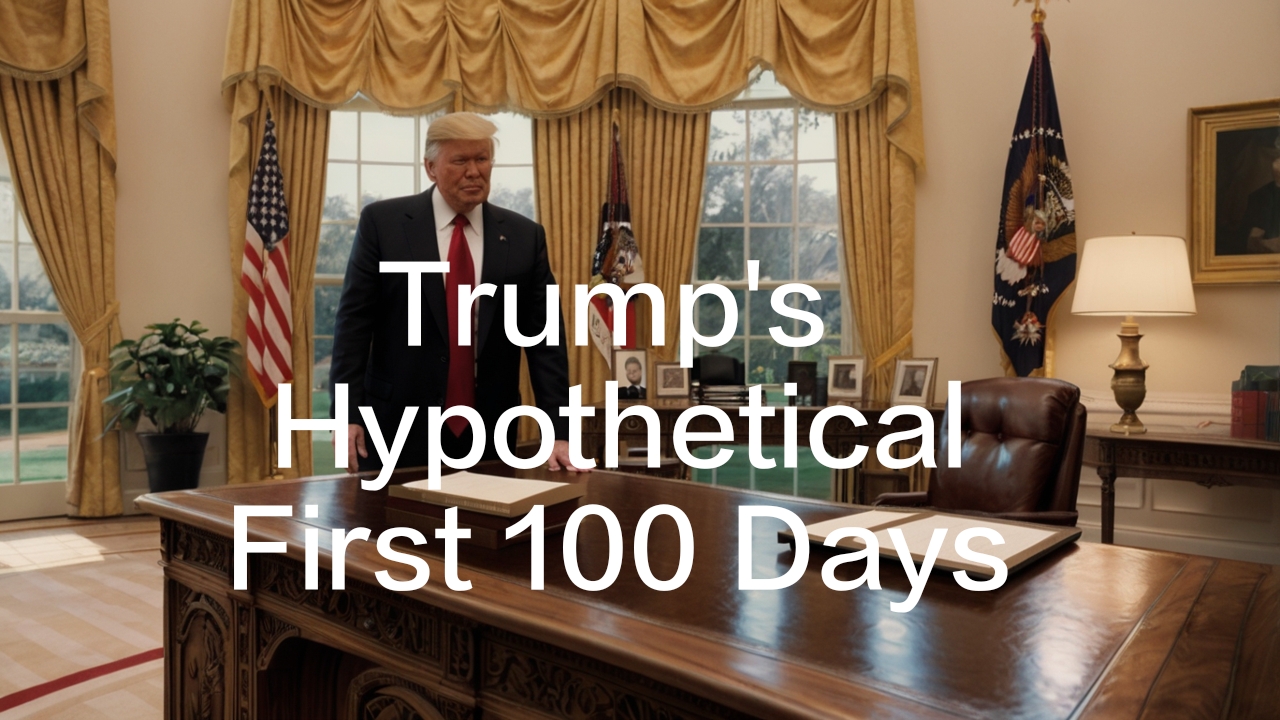Stepping Back In: Inside Trump’s Hypothetical ‘First 100 Days’ in the Oval Office
Imagine the scene: stepping back into the historic Oval Office, a space steeped in power and history. As captured in a transcript of a hypothetical interview with ABC News’ Terry Moran, this was the setting for President Donald J. Trump on the 100th day of a potential second term.
The feeling? “Triumphant,” he admits.
More than just a political summary, the conversation—though often combative—offered a window into the man himself: his deep connection to the office, unwavering convictions, and characteristic way of tackling the nation’s biggest challenges, from the economy to immigration.
More Than Just a Room: The Oval Office Through His Eyes
The interview begins with a personal moment—a tour of the Oval Office. Trump speaks with pride, calling the Resolute Desk “spectacular” and sharing why he chose it.
He sees the Oval Office as symbolic: a space where, if “properly used,” great things can happen.
His chosen portraits—Reagan, FDR, Lincoln, Washington, and Monroe—aren’t just decorations. To him, they represent “great men of great achievement,” reflecting his own values and love for the country.
He describes himself as:
- A “very detailed person”
- Someone who values cleanliness
- A leader who emphasizes beautification and modernization
This isn’t just an office for him—it’s a personal domain he feels responsible for.
The Defining Priority: Closing the Border
When asked about the biggest accomplishment in his hypothetical first 100 days, his answer is instant and emphatic: the border.
He paints a grim picture of what he believes happened under the previous administration—prisoners, gang members, murderers, even people from mental institutions entering the country.
He claims:
- The border is now “99.9% closed“
- The crisis was solved so quickly “nobody thought that could happen”
For him, this is more than policy—it’s a mission, and it’s one he believes he’s already winning.
Taking on the World: Tariffs, Trade, and Taming Inflation
Naturally, the conversation shifts to the economy, the issue Trump says was key to his return.
When pressed on:
- Tariffs
- The trade war with China
- Concerns over rising prices
His response is combative but confident.
He insists:
- Tariffs are necessary to fight back against countries that’ve been “ripping us off“
- In his first term, he had “massive tariffs” but no inflation
- The current inflation is entirely the fault of the previous administration
He cites examples like:
- Gasoline prices falling
- Eggs dropping by 87%, even saying there were “plenty of eggs for Easter”
When challenged on the 145% tariff on China, he dismisses concerns:
“You don’t know that,” he replies bluntly.
According to him, China will eat the cost, or businesses will relocate. He brushes aside the concerns of small import-dependent businesses, instead pointing to “$7–8 trillion” in investments he claims are flowing into the U.S.
His message: “Everything’s going to be just fine.”
The Hard Edge of Enforcement: Methods and Due Process
Despite a claimed drop in illegal crossings, tension rises when questions of due process for deportees emerge.
He doesn’t directly address the legal requirement for hearings. Instead, he emphasizes:
- The enormity of the challenge: “21 million people”
- The danger he believes they pose: criminals, murderers
- The impracticality of trials for each: “Do you think we can give 21 million trials?”
He makes his stance clear: illegal immigrants have a “different standard” of due process.
The Venezuelan Deportations & Joe Rogan’s Concern
When questioned about deporting Venezuelans to El Salvador, and Joe Rogan’s criticism about not becoming “monsters,” Trump briefly agrees on being careful—but stands firm.
He claims:
- Venezuela emptied its jails into the U.S.
- Deportation is not optional, but a mandate he was elected to carry out
He defends the deportation of Kilmar Abrego Garcia, alleged MS-13 member, despite a court order—criticizing judges he feels don’t treat his administration fairly.
A Glimpse Into the President’s Worldview
This hypothetical transcript offers more than policy—it gives us a glimpse into Trump’s mindset and style.
- A personal, almost emotional connection to the Oval Office
- A strong belief in decisive, immediate action
- A pattern of blaming past leadership
- A tendency toward unfiltered, direct communication
Your Turn: What Do You Think?
What’s your biggest takeaway from this hypothetical 100-day check-in?
Do you agree with his approach? Disagree? Something in between?
Let us know your thoughts in the comments below!
